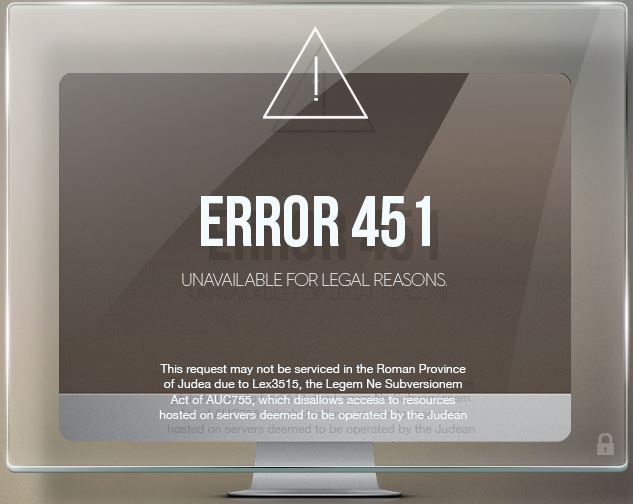HTTP '451' Error Code Stands For Censorship
Back in 2012, Tim Bray, a co-author of the XML specification and a former Google engineer, proposed that there should be an HTTP error code that more accurately describes when a web site or web page is taken down for legal reasons (often called censorship).
He suggested that the error code should be called “451,” as a tribute to "Fahrenheit 451," a popular novel about censorship. Three years later, the 451 error code was standardized by the Internet Engineering Task Force (IETF).
Tim Bray also suggested that when a web site is being blocked and it returns the 451 error code, it should also specify under which law or authority the content was taken down, for the sake of transparency.
Governments should at least be able to admit that they were responsible for taking down the content, whether it was through a Court order or some other executive action. If governments indeed have good reasons for censoring a page, then they shouldn’t be afraid of saying that, especially when most such censorship laws usually pass with broad support.
Mark Nottingham, who is the chairman for the Internet Engineering Steering Group (IESG), wrote that, "As censorship became more visible and prevalent on the Web, we started to hear from sites that they'd like to be able to make this distinction. More importantly, we started to hear from members of the community that they wanted to be able to discover instances of censorship in an automated fashion."
Apparently, this need for an automated way to measure how many web sites and pages are being censored is what ultimately convinced the standardization body to adopt it. Now, it’s up to web sites to actually implement it on their pages whenever there’s a legal request for a page to be taken down.
In some countries, the web site operators may not be allowed to post under what circumstances the pages were taken down, in which case they’ll likely continue to use error codes such as 403 (Forbidden) or 404 (File Not Found). However, the problem here is that it misleads the visitors into thinking the page may not be available for technical, rather than legal, reasons.
Get Tom's Hardware's best news and in-depth reviews, straight to your inbox.
Mark Nottingham also believes that in most cases it will be web site operators that will publish the censorship error code, rather than intermediaries such as ISPs:
“By its nature, you can't guarantee that all attempts to censor content will be conveniently labeled by the censor. Although 451 can be used both by network-based intermediaries (e.g., in a firewall) as well as on the origin Web server, I suspect it's going to be used far more in the latter case, as Web sites like Github, Twitter, Facebook and Google are forced to censor content against their will in certain jurisdictions.”
Lucian Armasu is a Contributing Writer for Tom's Hardware. You can follow him at @lucian_armasu.
Lucian Armasu is a Contributing Writer for Tom's Hardware US. He covers software news and the issues surrounding privacy and security.
-
rayden54 There's legal reasons and legal reasons. On one hand you've got simple government censorship on the other you've got innocent victims of crap like revenge porn. Don't like it when the two are equated. People get up in arms about government spying, but at least they're not likely to post it all on Youtube.Reply -
I'm not sure Error 451 is going to be all that useful.Reply
Most governments just censor sites by blocking them. You'd probably get a 503 (Service Unavailable) or 504 (Gateway Timeout) instead of a 451 in that case.
And I'm not sure a lot of sites are going to implement error 451 for some of their content. If anything, I can see the Japanese returning a 451 every time someone tries to access their sites from outside Japan instead of a 403 (Forbidden), but maybe they won't bother with that either. -
alidan ReplyThere's legal reasons and legal reasons. On one hand you've got simple government censorship on the other you've got innocent victims of crap like revenge porn. Don't like it when the two are equated. People get up in arms about government spying, but at least they're not likely to post it all on Youtube.
in one case, its censorship, in the other its illegal content, not so much censorship.
-
eriko Definately a step in the right direction.Reply
Then you can get straight on with appealing the decision to censor / take-down, without some basic diagnostics first... -
computertech82 Misleading calling it Censorship.( Fahrenheit 451 was a interesting movie). It could be sites being blocked for illegal movies, tv shows, CHILD PORN, just to name a few. Stop with the delusion freedom = illegal goods.Reply
